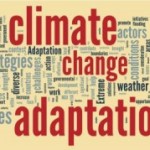 Whilst climate change isn’t as high on the agenda as perhaps it was before the financial crash a few years ago, it remains one of the more pressing global issues. Most attempts to do something about it have become mired in political wrangling, so it’s pleasing to see a number of attempts in the past year where the crowd have organized themselves to do their bit.
Whilst climate change isn’t as high on the agenda as perhaps it was before the financial crash a few years ago, it remains one of the more pressing global issues. Most attempts to do something about it have become mired in political wrangling, so it’s pleasing to see a number of attempts in the past year where the crowd have organized themselves to do their bit.
Last month for instance saw the global Hack4Good hackathon, where developers, designers and activists from around the world pooled their talents and resources to see what they could come up with over the course of a weekend. The event attracted around 3,000 participants, and a number of interesting projects emerged from it.
The past month has also seen the winners announced in the MIT Center for Collective Intelligence’s Climate CoLab, which is an open innovation challenge around the topic of climate change.
The contest saw hundreds of ideas proposed, before 34 winners were selected across 17 categories. Whilst the Hack4Good weekend was notable for the fact that all participants had to devise something actionable by the end of the event, the Climate CoLab winners included some that could only be actioned by others. For instance, one of the more contentious categories was a prompt to design a national carbon price in the US, with the two winners creating various designs, which would obviously need quite a bit more work before they could be delivered.
Other winners were slightly more self-contained. For instance, FutureCoast is a collaborative storytelling environment that aims to provide a glimpse into possible climate futures. The platform allows people to record a voicemail message where users outline what they think the future will be like.
“We’re finding voicemails from the future – come listen” is how FutureCoast brand themselves. The aim is to encourage a wide range of participants to share how they think the future will evolve, and how the climate will change in that time.
The organizers of the challenge believe the strength of their competition lies in the diversity of backgrounds the participants arrived from.
“What makes these proposals unusual is that they weren’t hashed out in oak-paneled conference rooms at elite international meetings,” Thomas Malone an MIT professor and principal investigator for the Climate CoLab, said in a statement. “These proposals were conceived and developed by people from many different backgrounds from all over the world, and then selected as sound ideas by respected science and policy experts.”
The competition saw around 600 proposals put forward this year, with 14,000 votes cast to help decide upon the eventual winners. The overall winner of the competition is due to be announced at CoLab’s 2014 Conference next month, with the winning entry receiving a prize of $10,000.
Sounds a bit of a cop out. This isn't something that one or two people can solve in isolation.